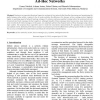132
click to vote
TON
2010
14 years 9 months ago
2010
Distributed opportunistic scheduling (DOS) is studied for wireless ad-hoc networks in which many links contend for the channel using random access before data transmissions. Simpl...
125
click to vote
OPODIS
2010
15 years 8 days ago
2010
Abstract. Wireless Ad-hoc networks are distributed systems that often reside in error-prone environments. Self-stabilization lets the system recover autonomously from an arbitrary ...
106
click to vote
CJ
2004
15 years 2 months ago
2004
We study the effects of physical layer parameters on the connectivity of fading wireless ad-hoc networks. Relying on a symbol error rate connectivity metric for wireless ad-hoc net...
120
click to vote
IAJIT
2007
15 years 2 months ago
2007
: Routing is an important functional aspect in wireless ad-hoc networks that handles discovering and maintaining the paths between nodes within a network. Due to nodes mobility, th...
109
Voted
MONET
2006
15 years 2 months ago
2006
In this paper we study connectivity in wireless ad-hoc networks by modeling the network as an undirected geometric random graph. The novel aspect in our study is that for finding t...
154
click to vote
CSREASAM
2006
15 years 3 months ago
2006
Wireless ad-hoc networks do not rely on a pre-existing network structure and are characterized by dynamic changes in the topology. This characteristic makes it difficult to perform...
198
Voted
MOBICOM
2000
ACM
15 years 6 months ago
2000
ACM
As the recent denial-of-service attacks on several major Internet sites have shown us, no open computer network is immune from intrusions. The wireless ad-hoc network is particula...
120
Voted
ISORC
2002
IEEE
15 years 7 months ago
2002
IEEE
Augmented reality and group communication in wireless ad-hoc networks form relatively new fields of research. When using group communication ordering and timeliness requirements ...
121
click to vote
PERVASIVE
2004
Springer
15 years 7 months ago
2004
Springer
We propose a novel solution for securing wireless ad-hoc networks. Our goal is to provide secure key exchange in the presence of device failures and denial-of-service attacks. The ...



